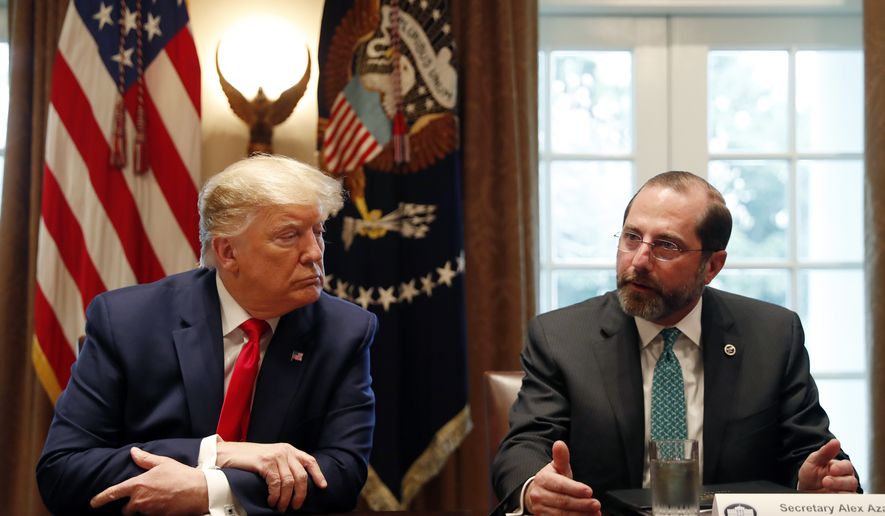Former coronavirus patients like actor Daniel Dae Kim swear by it, but even after receiving emergency FDA approval, the anti-malarial drug hydroxychloroquine still has an image problem on the left after being touted by President Trump.
The FDA issued an emergency-use authorization late Sunday for chloroquine and its next-generation version, hydroxychloroquine, as treatments for the novel coronavirus, fueling the political back-and-forth that erupted March 19 when Mr. Trump called hydroxychloroquine a potential “game changer.”
“I don’t understand how the FDA can approve anti-malaria drugs chloroquine and hydroxychloroquine for the coronavirus without any reputable clinical trials proving that they work,” tweeted Dr. Eugene Gu, an outspoken Trump social media critic. “FDA decided to use human beings as guinea pigs based on anecdotal reports and advice from Dr. Trump.”
After Twitter removed Monday a post by Fox host Laura Ingraham highlighting one doctor’s success with hydroxychloroquine, conservatives erupted, with some calling the drug’s opponents “deniers.”
“Because Trump mentioned it as a potential treatment, expect the Hydroxychloroquine-deniers in the media to furiously report on any, & EVERY, negative interaction or non-therapeutic result,” tweeted the Bongino Report’s Dan Bongino. “Essentially creating a new standard for pharmaceutical reporting applying only to this drug.”
Conservative pundit Ben Shapiro tweeted, “So it’s a no on ’hydroxychloroquine is a promising treatment’ but yes on the Chinese government claiming that coronavirus originated in the US. Just to get this straight, @jack,” referring to Twitter CEO Jack Dorsey.
The drugs, which are FDA-approved for malaria, lupus and rheumatoid arthritis, have been used to treat coronavirus patients in Belgium, China and South Korea. U.S. medical centers have increasingly added hydroxychloroquine off-label to their treatment protocols in combination with azithromycin, while New York has begun clinical trials.
Still, aside from a small study out of France that showed promising results, information on the drug’s impact on COVID-19 is mainly anecdotal, in large part because the virus is too new to have been extensively studied.
Among those anecdotes is the case of Mr. Kim, who called the drug the “secret weapon” in his recovery. Jim Santilli, CEO of the Transportation Improvement Association, said that the drug combination “saved my life” after he was hospitalized with COVID-19.
“It was a struggle to breathe and I felt like I was slowly drowning,” tweeted Mr. Santilli. “Luckily, the doctors decided to try Hydroxychloroquine and Azithromycin. Within a few hours, the gasping for air stopped and I began improving. I went home 3 days later!”
Only time will tell whether the drugs are effective in treating in COVID-19, but the skeptical tenor of the mainstream media coverage is already evident.
In a March 21 editorial, the USA Today editorial board declared, “Dr. Donald Trump peddles snake oil and false hope,” while CNN article challenged the president’s claims in an article headlined, “Trump peddles unsubstantiated hope in dark times.”
Bloomberg News followed up with “Malaria drug no better than regular coronavirus care, study finds,” even though the study published by the Journal of Zhejiang University in China involved only 30 patients and the results “weren’t statistically significant,” as the March 24 article admitted.
“The sound of it seems to be, ’Let’s deny him [Trump] a victory,’” said Tim Graham, director of media analysis for the conservative Media Research Center. “If there’s a light going on at the end of the tunnel, we need to smash the light to bits, even though we should be looking for hope at his point.”
Meanwhile, the progressive Media Matters for America blasted Fox News for its “reckless speculation and endorsement” of the drugs, accusing the network’s personalities of “creating a false impression of a working treatment for the deadly disease.”
The outrage peaked last week when an Arizona man accidentally poisoned himself ingesting a chloroquine phosphate product intended as fish-tank cleaner to self-medicate against COVID-19, prompting the [U.K.] Guardian headline, “Arizona man dies after attempting to take Trump coronavirus ’cure’.”
Fox host Tucker Carlson said that after the president expressed confidence in the drug, “That was it for the media.
“If Trump is for it, they’re against it, even if it might save American lives,” said Mr. Carlson last week. “And they immediately began a sustained push to discredit the drug long before clinical results in.”
After CNN reported Monday that “there is little scientific evidence” showing that the treatments are effective, Ms. Ingraham weighed in on Twitter.
“Why does CNN not recognize the COVID patients all over the world who have walked out of hospitals testing negative after being treated with hydroxychloroquine?” she tweeted.
• Valerie Richardson can be reached at vrichardson@washingtontimes.com.




Please read our comment policy before commenting.